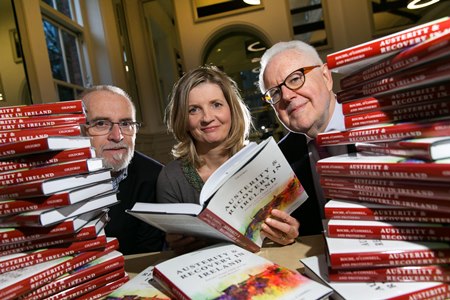"Austerity and Recovery in Ireland: Europe's Poster Child and the Great Recession"
- Date: Thu, Jan 19, 2017
Share this article
A landmark book assessing Ireland’s experience facing austerity in the aftermath of the financial crisis and analysing the recovery experienced in recent years has been launched at UCD Smurfit School. The book, entitled, “Austerity and Recovery in Ireland: Europe’s Poster Child and the Great Recession” is edited by Professors William K. Roche, Andrea Prothero (UCD Michael Smurfit Graduate Business School) and Professor Philip J. O’Connell (Geary Institute for Public Policy, UCD).

One of the key conclusions from the book, which is the most comprehensive assessment of Ireland post the onset of the economic crisis in 2008, is that Ireland’s recovery should not be attributed simply to austerity policies. The book also highlights the lack of transformative reform achieved in the political system and public sector and how Ireland’s economy remains vulnerable. The book includes 17 chapters, with 24 leading independent academics covering economic, political, social and cultural perspectives. Among the specific themes explored are: banking regulation; political reform; public sector reform; housing; and unemployment.
The book highlights how Ireland’s recovery was due to highly unusual features, specific to Ireland, which shaped a route to recovery unavailable to other countries also experiencing economic collapse. These features included the export performance of multinational firms trading in international markets that had suffered less seriously from the Great Recession, as well as the pragmatic approach adopted by Irish policymakers to the bailout; a lack of political and social dissent to austerity measures; and Ireland’s long-standing and distinctive industrial and corporate tax policies.
The political and social context that sustained austerity and the reforms (or lack thereof) which followed are also assessed. While there were ambitious plans for institutional reforms and radical change with regards banking, business, the public sector, housing, and even political institutions, success varied. There were significant successes in both the restructuring of financial institutions and in financial regulation. However, reforms in other areas were more varied. Radical reforms of Ireland’s political system did not take place. Pay levels and numbers were cut in the public sector, but while transformative structural reforms were proposed for the public sector, these have been slow to materialize. While working hours and employment were often reduced in the private sector, many basic underlying features of workplaces remained largely unchanged. Reforms in labour market policy, which took the form of a shift to more active intervention to assist the unemployed, were deferred until 2011, well into the crisis. Within the housing sector we witnessed not only how housing policy contributed to the financial crisis, but how recovery created more dysfunctions within the sector, and policies to alleviate emerging housing shortages and escalating costs failed miserably.
In evaluating Ireland’s experience during this unique period in its history, the costs of austerity and the profound impact the Great Recession had on all aspects of Irish life are fully explored. These include an assessment of the labour market, workplaces, migration, public management, consumption, housing, inequality and disadvantage, and culture. Perhaps the biggest losers were those who lost their jobs in the recession, with employment falling by over 300,000. About 600,000 people left Ireland, around half of whom were Irish citizens. Emotional and financial costs were felt across the country – and ranged from families suffering the effects of emigration, communities affected by a loss of young people leaving, as well as decreases in community and social activities. Sadly, suicide levels by men increased, as did self-harming incidents amongst both genders. These changes occurred against a backdrop of significant decreases in disposable income. Ireland’s inequality before the crisis was one of the highest in the OECD, and while overall income inequality (as measured by the Gini coefficient) did not worsen during the austere times, there were significant increases in basic deprivation and consistent poverty.
While Ireland’s recovery was remarkable, the book’s authors question the role austerity measures played in this recovery, and emphasise that the country remains vulnerable, particularly when the forces which contributed to the dramatic recovery could be easily reversed.
The book will be officially launched by Professor Patrick Honohan, former Governor of the Central Bank of Ireland, on Thursday, 19th January, 2017, at 5.45pm at the UCD Michael Smurfit Graduate Business School. The launch will be preceded by a symposium of Irish academics – Professor Mary Corcoran, Professor John Fitzgerald, Dr Stephen Kinsella and Dr Theresa Reidy who will discuss key themes from the book with its editors, Professors William K. Roche, Andrea Prothero (UCD Michael Smurfit Graduate Business School) and Professor Philip J. O’Connell (Geary Institute for Public Policy, UCD).
‘Austerity and Recovery in Ireland’ is published by Oxford University Press (2017) and available for purchase in: UCD Campus Bookshop, Belfield, Dublin 4; Hodges Figgis, Dawson Street; and the Open Book Co., Kinsealy, County Dublin.












